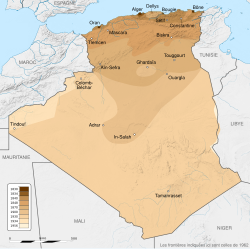French rule in Algeria
| French Algeria (English) الاحتلال الفرنسي للجزائر (Arabic) ⵜⴰⵙⴻⵃⵔⴻⵙⵜ ⵏ ⴼⵔⴰⵏⵙⴰ (Berber) |
||||||
| Colonial Départements of France | ||||||
|
||||||
|
||||||
|
Anthem La Marseillaise (instrumental only) |
||||||
| Chronological map of French Algeria's evolution. | ||||||
| Capital | Algiers | |||||
| History | ||||||
| • | Surrender of Algiers | July 5, 1830 | ||||
| • | Algerian Independence | July 3, 1962 | ||||
| Today part of |
|
|||||
French Algeria (French: Alger to 1839, then Algérie afterward; unofficially Algérie française,Arabic: الجزائر الفرنسية, Al-Jaza'ir al-Fransiyah) began in 1827 with the blockade of Algiers by the French navy and lasted from 1830 to 1962, under a variety of governmental systems. From 1848 until independence, the whole Mediterranean region of Algeria was administered as an integral part of France. The vast arid interior of Algeria, like the rest of French North Africa, was never considered part of France. One of France's longest-held overseas territories, Algeria became a destination for hundreds of thousands of European immigrants, known as colons and later, as pieds-noirs. However, indigenous Muslims remained a majority of the territory's population throughout its history. Gradually, dissatisfaction among the Muslim population with its lack of political and economic status fueled calls for greater political autonomy, and eventually independence, from France. Tensions between the two population groups came to a head in 1954, when the first violent events of what was later called the Algerian War began. The war concluded in 1962, when Algeria gained complete independence following the March 1962 Evian agreements and the July 1962 self-determination referendum.
Since the 1516 capture of Algiers by the Ottoman admirals, the brothers Oruç and Hayreddin Barbarossa, Algeria had been a base for conflict and piracy in the Mediterranean. In 1681, Louis XIV asked Admiral Abraham Duquesne to fight the Berber pirates and also ordered a large-scale attack on Algiers between 1682 and 1683 on the pretext of assisting Christian captives. Again, d'Estrées bombarded Tripoli and Algiers from 1685 to 1688. An ambassador from Algiers visited the Court in Versailles, and a Treaty was signed in 1690 that provided peace throughout the 18th century.
...
Wikipedia



